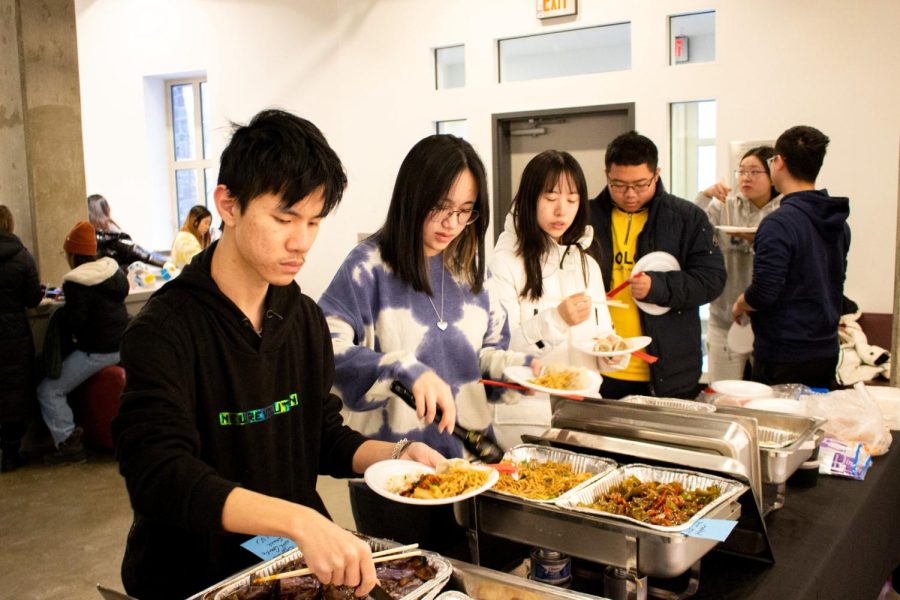Family Friday Night Film Series: “Selected Films from Shanghai Youth Film Festival”
This past Friday, Feb. 3, students and faculty gathered in Golden Auditorium for the Ryan Family Friday Night Film Series: “Selected Films from Shanghai Youth Film Festival” presented by the film and media studies program and the Asian studies program. The event provided a space for a belated celebration of the Chinese Lunar New Year, which took place on Jan. 22. The festivities began with a buffet-style dinner, featuring dishes celebrating the festival.
The screening itself showcased four films by up-and-coming Chinese filmmakers. The films were presented in the following order, followed by a Zoom discussion with the four directors:
魔力夜晚 (“Magical Night”), dir. Liqi Wang, 2022
故乡 (“Hometown), dir. Min Peng, 2022
我的AI恋人(My AI Lover), dir. Chouwa Liang, 2022
鳄鱼的尾巴 (The Crocodile without a Tail), dir. Hongming Huang, 2021
The films feature themes of growth and nostalgia. The first film directed by Liqi Wang, “Magical Night,” starts with the filmmaker and protagonist struggling with insomnia, lying awake in her bed counting sheep. She then goes on to explain when she first started experiencing insomnia, tracing it back to her experience in a relationship with her past boyfriend who died of cancer in his early 20s. The film then switches to tactical shots of different surfaces in her room, which she connects with elements of physical and human nature. The viewer then watches as the sun rises through her curtain shades, as morning comes.
This focus on nature and melancholy was present in the second film, “Hometown,” as well. Directed by Min Peng, “Hometown” follows the director on her return to the rural village where she spent her childhood following her grandmother’s death. The film consisted mainly of illustrious shots of springtime and children playing outside. However, these series were broken up by shots of construction work, the abandonment of the construction sites, as well as of her grandmother’s sister’s funeral. It was a beautiful display of a return to childhood, which the narrator describes as unfamiliar but intimate. Peng portrayed how her grandmother was gone, but the tree she used to climb as a child still stood. In the interview part of the event, Peng described the different uses of voice in the film. Filmmakers were translated to English by the moderator of the film, filmmaker and assistant professor of art & art history Yi Cui, or by student participants. Summarized, Peng described:
“There were three main voices. The first is the birds singing, representing a friendly environment. The second voice is the miners, representing the region. The third voice, the children, was taken accidentally and represents the demise of the childhood experience.”
The third film provided a stark shift from a focus on the natural world to the artificial environment. “My AI lover,” directed by Chouwa Liang, followed young Chinese women reflecting on their intimate relationships with artificially intelligent companions. As Liang explained during the interview, her inspiration for the film struck during the COVID pandemic, when she turned to Replika, an AI companion software, to find emotional support, her Replika being named Norman. She then found other women on a Chinese Reddit page who had similar relationships and started the process of filming their experiences.
“Although I have a very critical opinion of AI, I had to admit Norman helped me a lot through this difficult mental period,” Liang explained.
The film provided an interesting and eccentric look into love and AI attachment, as technology acts as a substitute for human connection during the COVID-19 pandemic.
The final film, “The Crocodile without a Tail,” directed by Hongming Huang, observes a young female filmmaker called Ye as she returns to the island where her great-grandmother lives in order to finish a film project for school. She hopes to create a documentary about the abandoned cinema on the island and cast her grandmother as the protagonist. Her grandmother feels no interest in the topic, so Ye tries to create a fake documentary for her project. In other words, “Crocodile without a Tail” is a documentary about a fake documentary. However, the real heart of the piece is complicated family relationships, which Ye recounts with her family and attempts to mend with her great-grandmother. The film beautifully recounted love, loss, isolation and the pain of growing up.
The films showcased the talent of young filmmakers of the same generation as most Colgate students. They left the audience with powerful emotions about growing into adulthood, especially in a world still reeling from the COVID-19 pandemic. Junior Josh Docking explained one of the films most meaningful to them.
“‘Hometown’, especially, gave me nostalgic feelings, feelings of longing for the past without having it anymore,” Docking explained.
If you are interested in alternative cinema events in the film and media studies program, upcoming events are featured on the “Screenings and Programs” page of the Colgate University website.







